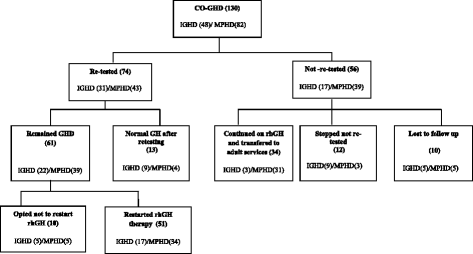An audit of the management of childhood-onset growth hormone deficiency during young adulthood in Scotland
- PMID: 26985190
- PMCID: PMC4793498
- DOI: 10.1186/s13633-016-0024-8
An audit of the management of childhood-onset growth hormone deficiency during young adulthood in Scotland
Abstract
Background: Adolescents with childhood onset growth hormone deficiency (CO-GHD) require re-evaluation of their growth hormone (GH) axis on attainment of final height to determine eligibility for adult GH therapy (rhGH).
Aim: Retrospective multicentre review of management of young adults with CO-GHD in four paediatric centres in Scotland during transition.
Patients: Medical records of 130 eligible CO-GHD adolescents (78 males), who attained final height between 2005 and 2013 were reviewed. Median (range) age at initial diagnosis of CO-GHD was 10.7 years (0.1-16.4) with a stimulated GH peak of 2.3 μg/l (0.1-6.5). Median age at initiation of rhGH was 10.8 years (0.4-17.0).
Results: Of the 130 CO-GHD adolescents, 74/130(57 %) had GH axis re-evaluation by stimulation tests /IGF-1 measurements. Of those, 61/74 (82 %) remained GHD with 51/74 (69 %) restarting adult rhGH. Predictors of persistent GHD included an organic hypothalamic-pituitary disorder and multiple pituitary hormone deficiencies (MPHD). Of the remaining 56/130 (43 %) patients who were not re-tested, 34/56 (61 %) were transferred to adult services on rhGH without biochemical retesting and 32/34 of these had MPHD. The proportion of adults who were offered rhGH without biochemical re-testing in the four centres ranged between 10 and 50 % of their total cohort.
Conclusions: A substantial proportion of adults with CO-GHD remain GHD, particularly those with MPHD and most opt for treatment with rhGH. Despite clinical guidelines, there is significant variation in the management of CO-GHD in young adulthood across Scotland.
Keywords: Adolescence; Childhood onset growth hormone deficiency; Re-evaluation; Retesting; Transition.
Figures
References
-
- Carroll PV, Christ ER, Bengtsson BA, Carlsson L, Christiansen JS, Clemmons D, et al. Growth hormone deficiency in adulthood and the effects of growth hormone replacement: a review. Growth Hormone Research Society Scientific Committee. J Clin Endocrinol Metab. 1998;83(2):382–95. doi: 10.1210/jcem.83.2.4594. - DOI - PubMed
LinkOut - more resources
Full Text Sources
Other Literature Sources
Miscellaneous


